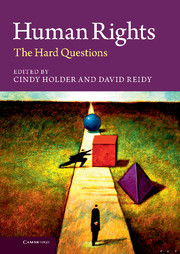Book contents
- Frontmatter
- Contents
- Figure
- List of table
- Notes on contributors
- Introduction
- Part I What are human rights?
- Part II How do human rights relate to group rights and culture?
- Part III What do human rights require of the global economy?
- Part IV How do human rights relate to environmental policy?
- Part V Is there a human right to democracy?
- 14 Is there a human right to democracy?
- 15 The human right to democracy and its global import
- 16 An egalitarian argument for a human right to democracy
- Part VI What are the limits of rights enforcement?
- Part VII Are human rights progressive?
- Index
- References
15 - The human right to democracy and its global import
Published online by Cambridge University Press: 05 May 2013
- Frontmatter
- Contents
- Figure
- List of table
- Notes on contributors
- Introduction
- Part I What are human rights?
- Part II How do human rights relate to group rights and culture?
- Part III What do human rights require of the global economy?
- Part IV How do human rights relate to environmental policy?
- Part V Is there a human right to democracy?
- 14 Is there a human right to democracy?
- 15 The human right to democracy and its global import
- 16 An egalitarian argument for a human right to democracy
- Part VI What are the limits of rights enforcement?
- Part VII Are human rights progressive?
- Index
- References
Summary
Introduction
A human right to democracy is controversial, at least among political philosophers, if not on the streets of Tunisia, Egypt, Syria, and even Iran. Although the Universal Declaration of Human Rights specifies a right to take part in the government of one’s country, including free elections with universal suffrage, in an article sometimes referred to as specifying a right to democracy, the term democracy is not explicitly mentioned there, perhaps because of political concerns at the time of its drafting. Indeed, some philosophers have advanced influential arguments against recognizing such a human right, generally proceeding from within a Rawlsian framework of justice. In this chapter, I will begin by considering – and putting aside – some of the objections that have been lodged against recognizing democracy as a human right. Among these objections are (1) that if democracy were recognized as a human right, that would enable forcible intervention to impose it on countries that lack it, which would in turn involve interference with the internal affairs of the country involved; (2) relatedly, that requiring democracy would violate the premier human right of self-determination and would additionally not show an appropriate level of toleration for societies that are not fully liberal though presumably respectful of human rights (what Rawls calls “decent” societies); (3) and further, that it would involve a Western or liberal imposition on societies organized around a common good or social harmony conception; and (4) perhaps most problematically, that democracy requires equality, which is too demanding for some societies, and is not required by a minimal or less demanding list of human rights. I will not be able to consider all these objections in depth in this chapter, but will focus primarily on the last one, which has been advanced by Joshua Cohen (2006).
- Type
- Chapter
- Information
- Human RightsThe Hard Questions, pp. 285 - 300Publisher: Cambridge University PressPrint publication year: 2013
References
- 5
- Cited by

